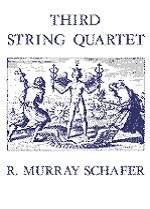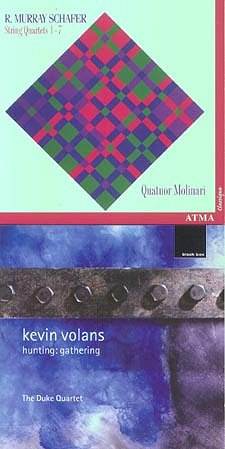S&H Article
SCHAFER and VOLANS STRING QUARTETS at Blackheath and on CD (PGW)
Raymond MURRAY SCHAFER and Kevin VOLANS STRING QUARTETS at Blackheath and on CDSCHAFER 3rd String Quartet; VOLANS 6th String Quartet; DVORAK Op. 96. Duke Quartet. 10 March 2002, Blackheath Halls
To my shame, the music of the Canadian composer R. Murray Schafer (b. 1933) was scarcely known to me, and this was both a brave and a wise programming choice for Blackheath's Sunday Morning series, which is justifiably attracting increasing attention. The audience was, predictably, not large, but less attenuated than had been the dire effect of presenting a notable trio with wind instruments (notoriously death to the box office!) the previous week.
Relevant to those problems, Shafer himself can be heard on line in his interview excerpt, Music behind walls, discussing his dissatisfaction with the limitations of concert halls and how in his forties he began to radically transform audience experience and expectations with musical theatre pieces in a variety of mostly outdoor settings often at dawn or overnight. Schafer talks about conventional critical divisions within the world of music and proposes a very different way of looking at cultural change.
Murray Schafer is well respected in his own country, and - ironically - he has published "British Composers in Interview" (1963). Has any of our composers reciprocated? His Patria (homeland) a cycle of related music dramas, is claimed as "perhaps the most radical and challenging cycle of music dramas to be produced within the past half century". About his eight string quartets, Schafer's publisher Arcana writes: - - string quartets occupy a special place in his repertoire and are considered to be among his most important works. The medium is pushed beyond traditional limits by the incorporation of spatial dislocations, movement and vocalization, but in each work the musical argument is always paramount. Although composed at different times in Schafer's career they contain many relationships and have been frequently performed together. N.B. There are no parts to the string quartets. All the players read from full scores. - -
This was a virtuoso work played continuously, and which stretched these excellent players, who clearly relished its demands and had no problems at all with the extended techniques required. The Duke Quartet has been associated with the minimalist persuasion, but Shafer's quartet has an adventurous, questing character at a level of complexity which remains within the bounds of the accessible. It was well received and should be readily accepted by audiences who have become used to the quartets of Bartok.
Schafer's No.3 was cleverly complemented with a quartet by the South African born, Ireland domiciled Kevin Volans, No. 6 of an impressive oeuvre. This one, if heard on radio or CD, would be better described as an Octet. In the concert hall it provides a unique fascination, with the four live players matched to perfection by their pre-recorded selves, transmitted with sound quality and balance so equal that the eye and ear strain to distinguish which is being heard. The music suggests a slightly less rarified Feldman, mostly quiet, serene rocking music, but with more variety of dynamic, and allowing some clashing harmonies occasionally. Kevin Volans is a complete individualist, who might perhaps be described loosely as an intelligent minimalist, who eliminates inessentials from his carefully crafted scores; John Woolrich is an English composer who, to my mind, shares some of his aesthetic in that respect.
Kevin VOLANS & R Murray Schafer String Quartets on CD
R Murray Schafer String Quartet No 1 - String Quartet No 2, 'Waves' - String Quartet No 3 - String Quartet No 4 - String Quartet No 5, 'Rosalind' - String Quartet No 6, 'Parting Wild Horse's Mane' - String Quartet No 7. Molinari Quartet ATMA ACD22188/9 [Dec 1999-Jan 2000, 70+57 mins]
Kevin Volans String Quartets No 1 (White Man Sleeps (1982), No 2 - Hunting gathering (1987), No 6 (2000) The Duke Quartet BlackBox BBM1069 [March 2001, 73 mins]
String Quartets Nos 4 & 5 The Duke Quartet Collins Classics 14172 [1995,Forde Abbey]Following up the Duke Quartet's performances of R Murray Schafer's 3rd and Volans' 6th at Blackheath, I have been sent the former's seven quartets and the latter's six. They make for fascinating comparison.
Kevin Volans has described his string quartets as the spine of his output and I recommend trying to find the 1995 release of nos. 4 & 5. The composer has (I trust) made a fortune through the runaway commercial success of the Kronos Quartet CDs of his earlier quartets (White Man Sleeps on Pieces of Africa, Elektra Nonesuch 7559-79275-2 - and Hunting Gathering - 7559-79253-2).
The latter title is hijacked, unfortunately in my view, for the Duke Quartet's new release of three Volans quartets, Nos. 1, 2 & 6 (Black Box BBM1069) The first two aim to reconcile African and European aesthetics, to explore elements of African music without 'westernising' it. Volans provides a commentary which merits careful study. The longest and, for me, most significant work on the new CD is String Quartet No.6 (2000), the one given at Blackheath.
This is a continuous slow, rocking movement on minimal chordal material 24 minutes long (he had wanted it to last about 55 mins, but the commissioning society would not agree!). It is really an octet for two string quartets, but can be played, as at Blackheath and here on CD, by one quartet with tape playback. Volans has been seeking simplification and the 'elimination of subject matter', a musical equivalent to that explored in visual arts a few decades back. "My ideal would be the equivalent of a blank canvas." That is, mercifully, far from the effect of this new quartet, with alternations of texture and dislocations of rhythm that hold constant attention. To my surprise it works well too with the musicians unseen, even though there had been that special, unique pleasure in watching the live+tape rendition in concert.
That conjunction brought a theatrical element into the Blackheath concert, where it was juxtaposed with the most dramatic of Schafer's seven. Raymond Murray-Schafer is a frankly theatrical composer and my positive response to his No.3 has been enhanced by hearing the complete cycle of seven. He continued to compose string quartets after the excellent Orford Quartet had recorded the first five and disbanded after completing that project. Theirs has now been superseded by the Molinari Quartet's of all seven composed to date (ATMA ACD22188/9).
These seven quartets have been described aptly as 'the strongest post-war North American cycle' (Gramophone, 5/2001), a claim which I enthusiastically endorse. They are as intense and intellectually complex as those of Bartok and Shostakovich and fully worthy to be spoken of with those august establishment names, and far more readily accessible than the Carter quartets which have become increasingly cool and recondite. Schafer sometimes expects his players to move around and to vocalise, with occasional additional percussion and very telling contributions by a singer (Marie-Danielle Parent, soprano) in two of them. There are links and continuities, e.g. the cellist is alone on stage at the end of No.2 and at the beginning of No.3. The Molinaris worked them up for concert with the composer one by one, and eventually gave the whole cycle in a single concert.
The performances set a benchmark standard and are vividly recorded. The presentation is lavish, with many musical examples and notes that are full and instructive, but the composer's description of the themes of No 6 "at figure 11" refers to the score - which purchasers are unlikely to have to hand! Why not have given them in track timings, so that listeners might follow them easily? And, having grasped that notion, if the recording achieves the success it deserves and requires re-pressing, why not provide timings for each of the 108 T'ai Chi sections?
The Schafer quartet cycle ideally needs to be experienced live, with the prescribed theatrical component, and should be given complete in UK as soon as possible, by the Canadian Molinari Quartet or by the British Duke Quartet.
Peter Grahame Woolf


 Return to:
Return to: